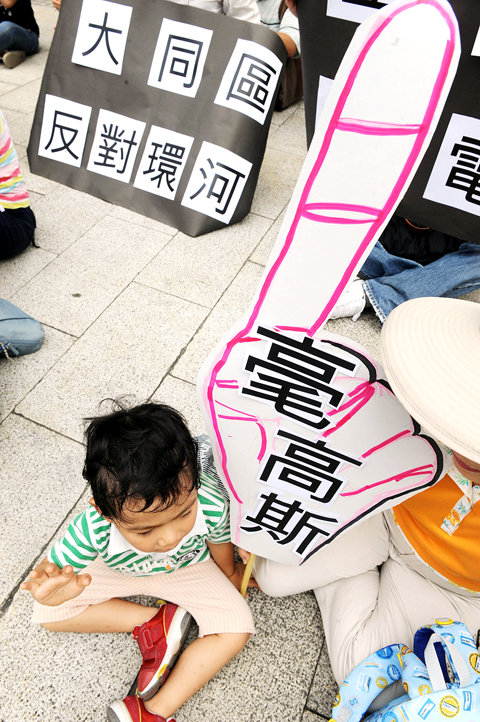Representatives of environmental groups gathered in front of the Environmental Protection Administration (EPA) yesterday to urge the government to lower electromagnetic wave safety standards to a maximum of 1 milli-Gauss (mG).
The agency is considering lowering electromagnetic wave safety standards by 10 percent for “sensitive regions” such as schools, hospitals and residential areas, but the activists said that was not enough.
Taiwan Electromagnetic Radiation Hazard Protection and Control Association chairwoman Chen Chiao-hwa (陳椒華) said the EPA was considering lowering the standard for sensitive areas from 833mG to 83.3mG.

PHOTO: CNA
“From WHO data, we know that advanced countries such as the US and Switzerland have an electromagnetic wave safety limit of 1mG. We fear that as Hsiao is on the EPA’s expert panel, his statement could cause a public misunderstanding,” she said.
She was referring to a recent remark by National Taiwan University of Science and Technology electric engineering assistant professor Hsiao Horng-Ching (蕭弘清) that even if an environment or location had an electromagnetic wave level of 8,300mG, there would be little harm to human health.
“Even at 83.3 milli-Gauss, people are still exposed to high health risks and are likely to develop chronic illnesses such as cancer, or give birth to children with mental retardation or other birth defects,” Chen said.
The environmental groups urged the government to follow the example set by other countries and set the nation’s safety limit to 1mG.
Air Quality Protection and Noise Control Director-General Hsieh Yen-ju (謝燕儒) said the EPA was not ready to decide on whether to lower the limit.
“To make sure we cover all the bases, we will hold more meetings with environmental groups, the National Communications Commission, the Department of Health and media representatives soon,” Hsieh said.
As for the debate over 1mG and 83.3mG standards, Hsieh said that since every country is different, the EPA would collect more information to determine what was best for Taiwan.

Alain Robert, known as the "French Spider-Man," praised Alex Honnold as exceptionally well-prepared after the US climber completed a free solo ascent of Taipei 101 yesterday. Robert said Honnold's ascent of the 508m-tall skyscraper in just more than one-and-a-half hours without using safety ropes or equipment was a remarkable achievement. "This is my life," he said in an interview conducted in French, adding that he liked the feeling of being "on the edge of danger." The 63-year-old Frenchman climbed Taipei 101 using ropes in December 2004, taking about four hours to reach the top. On a one-to-10 scale of difficulty, Robert said Taipei 101

Nipah virus infection is to be officially listed as a category 5 notifiable infectious disease in Taiwan in March, while clinical treatment guidelines are being formulated, the Centers for Disease Control (CDC) said yesterday. With Nipah infections being reported in other countries and considering its relatively high fatality rate, the centers on Jan. 16 announced that it would be listed as a notifiable infectious disease to bolster the nation’s systematic early warning system and increase public awareness, the CDC said. Bangladesh reported four fatal cases last year in separate districts, with three linked to raw date palm sap consumption, CDC Epidemic Intelligence

US climber Alex Honnold left Taiwan this morning a day after completing a free-solo ascent of Taipei 101, a feat that drew cheers from onlookers and gained widespread international attention. Honnold yesterday scaled the 101-story skyscraper without a rope or safety harness. The climb — the highest urban free-solo ascent ever attempted — took just more than 90 minutes and was streamed live on Netflix. It was covered by major international news outlets including CNN, the New York Times, the Guardian and the Wall Street Journal. As Honnold prepared to leave Taiwan today, he attracted a crowd when he and his wife, Sanni,

Taiwanese and US defense groups are collaborating to introduce deployable, semi-autonomous manufacturing systems for drones and components in a boost to the nation’s supply chain resilience. Taiwan’s G-Tech Optroelectronics Corp subsidiary GTOC and the US’ Aerkomm Inc on Friday announced an agreement with fellow US-based Firestorm Lab to adopt the latter’s xCell, a technology featuring 3D printers fitted in 6.1m container units. The systems enable aerial platforms and parts to be produced in high volumes from dispersed nodes capable of rapid redeployment, to minimize the risk of enemy strikes and to meet field requirements, they said. Firestorm chief technology officer Ian Muceus said